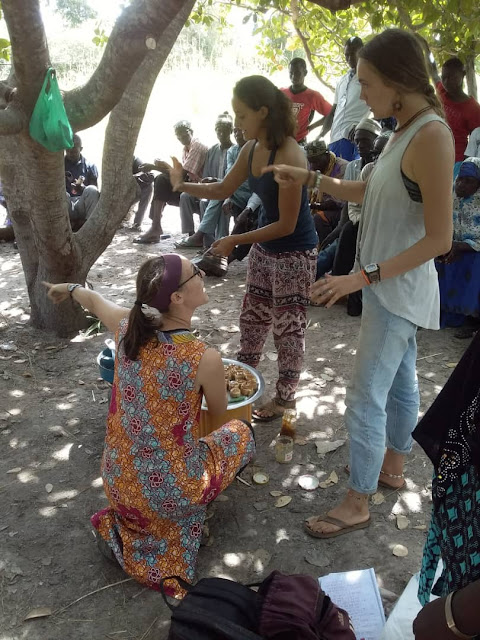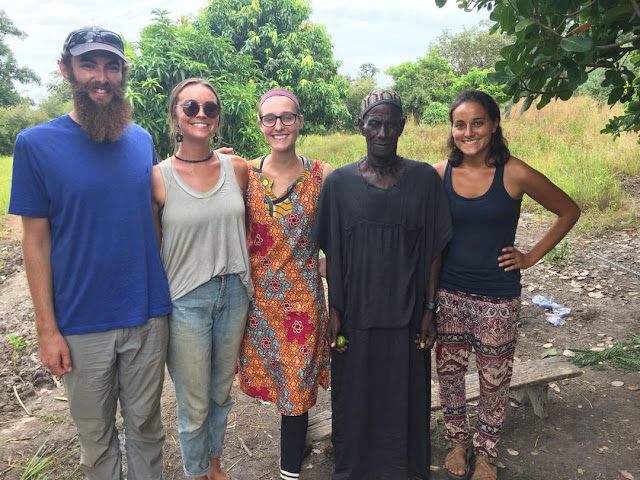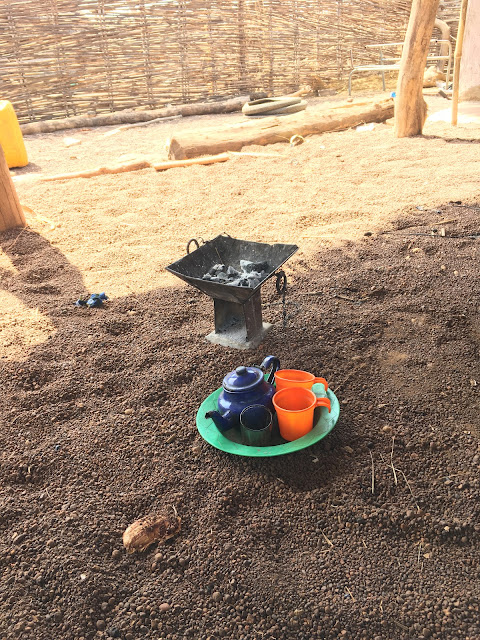The next week after traipsing to Lombel, I went on a short biking adventure to the Diakhanke (an alternate spelling of Jaxanke, my local language) area of Kedougou. I came into the city of Kedougou from my site (40km), then the next day biked out to a town in the Diakhanke area (61km) to help out with another volunteer's training. The other volunteer was helping her Master Farmer, Dembo Tigana, conduct an Open Field Day. Master Farmers are local farmers who receive funding from Peace Corps to be an agricultural extension agent in their communities. They each have a 1-hectare farm demonstrating agricultural techniques including composting, live fencing, tree nurseries, field crop spacing, and many others. Part of Master Farmers' work includes conducting Open Field Days, large half-day trainings with 50-100 participants, 1-2 times per year. In following with the theme of "things that are not near my village," there is no Master Farmer near my village. (Also included on this list are other Peace Corps volunteers, Diakhanke villages, and fruit and vegetables). When my fellow volunteers and I conducted our cashew training back in June, we did so at Tigana's Master Farm--I had been there before and was familiar with Tigana.
Four of us Diakhanke volunteers and Karamba, the Kedougou Regional Coordinator for Peace Corps were able to attend the Open Field Day. After the initial logistics--signing in and greeting the 60+ attendees--the event began. We started off with some prayers and an introduction of the notable attendees. Tigana named almost every person in the circle, so this took quite a lot longer than expected. He then took everyone on a brief tour of his farm, discussing some of the improved techniques he used for farming his rice, beans, and corn.
It was then time for us volunteers to do our lessons. The other three volunteers did lessons on jam-making, basic accounting and packaging, and malaria's impact on farmers' profits. We were pleasantly surprised to see how engaged all the attendees were in the lessons. They were especially excited about jam-making and asked lots of questions. When someone is speaking in a meeting, regardless of whether that person is a native speaker of the language or a Peace Corps Volunteer, someone else from the group will repeat or summarize each sentence that is said. The Senegalese person helping to "translate" the jam lesson had a very hard time saying the French word for jam, "confiture." He and everybody else in the group were laughing as he mispronounced the word a few times. At the end of the lesson, he referred to "confiture" as "I don't know the name," which gave everybody a good laugh. It was reassuring for us to see a group of Senegalese people make light of the fact that someone had trouble with a foreign word, as language is a daily challenge for every volunteer.
It was then my turn--I talked briefly about the importance of trees, outplanting technique, protecting trees from animals, and pruning. My language was flowing well that day and it seemed as if people were understanding and interested in what I was saying. I got some good questions about pruning technique followed by an unexpected question about fruit. An older man asked me, "Which types of fruit help get rid of disease and which types cause disease?" I did not know how to answer this one, so I said something like "I think all fruits are healthy," then deflected the question to Karamba, who handled it much more elegantly.
The day ended with a lunch of oily rice and beef. I caught a ride with Karamba back to my friend's site and spent a short evening chatting with her host family. We went to sleep early, exhausted from the day at the Master Farm. I biked the 47km back to Kedougou the next morning.
 |
| Jam session |
 |
| Jam session |
 |
| Jam poster |
 |
| Malaria activity. The rocks on the sheet represent crops to harvest |
 |
| The rocks move as people drop the sheet (representing that they got sick and cannot work in the fields) |
 |
| Rocks fall off the sheet (crops are lost) when lots of people get sick at the same time |
 |
| Double digging demonstration for garden beds |
 |
| Master Farmer Tigana showing attendees his rice |
 |
| Me listening to someone answer my question "Why are trees important?" |
 |
| The Diakhanke volunteers at the open field day with the nearby volunteer's host dad |













Comments
Post a Comment